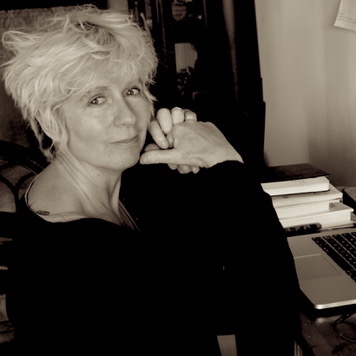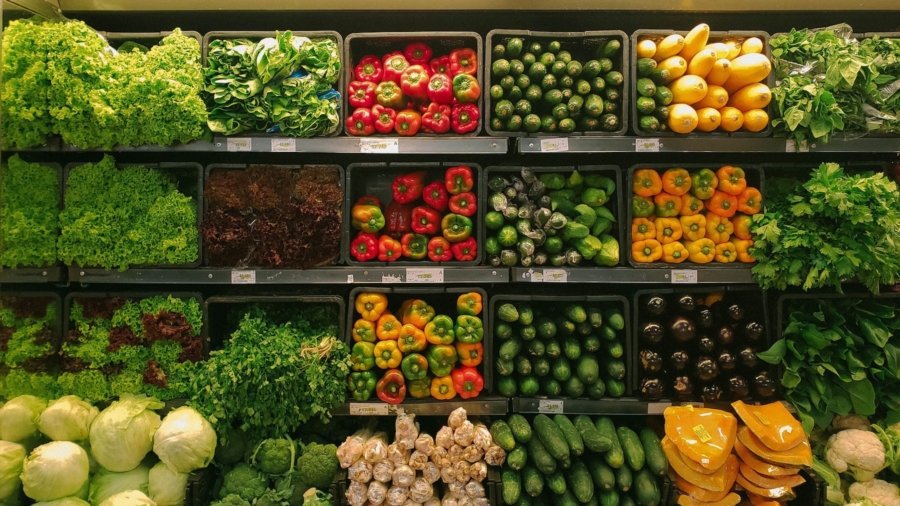Inaugurating the launch of her post-apocalyptic novel Londonia this week, Kate A. Hardy calls for a revival in simple food and cooking education and for a reconnection with plants and soil.
by Kate A. Hardy
Back in the 70s, my mother didn’t plan menus or follow recipes, apart from the odd one from her mother’s ancient cookery scrapbook. Dishes largely depended on what was cheap in the butcher’s that day – odd, unpopular things like heart and scrag-end of lamb made into a stew with whatever veg was in the local Greek shop down our road.
Supermarkets didn’t exist in their present enormity and we shopped locally. We ate healthily and my mother would probably have called herself a good plain cook with no budget to spare for anything fancy apart from the odd sachet of Angel Delight… A typical week might have looked like this: a roast chicken on Sunday, Monday: chicken in white sauce with peas and cabbage, Tuesday: chicken soup, Wednesday: jacket potatoes with cheese, Thursday: scrag-end of lamb casserole, Friday: same casserole with more veg, Saturday: treat (maybe) – fish and chips.
Finding and cooking of food are major preoccupations for the characters in my novel, Londonia. Set in 2072 and following a vast breakdown of society due to technological and climatic collapse, people are employing (and enjoying learning) forgotten gardening, foraging and cooking skills. Choice is a seldom used word.
When Sainsbury’s arrived on Muswell Hill Broadway, I recall people wandering around in awe: the choice… the ready meals and convenience! Mum didn’t have the money for choice, so the stews and veg continued and even though I complained a bit then, I am grateful now. Her simple food education got me through art college and on into real life with knowledge of how to cook inexpensively and healthily.
In school at that time we had home economics, a lesson in which we learned odd things like, how to wash a hairbrush – I remember this in perfect clarity – but also, more usefully, how to make bread, buns and soup. I don’t know what the present education system in the UK provides in this domain but in France – country of culinary passion – there is nothing in the curriculum that allows for basic food knowledge, both in where it comes from and how to cook it.
Our son is a keen cook but this stems from us showing him – certainly not from at any point in his education. How sad. Children are naturally curious about food preparation if you take time to involve them but I fear we are losing this, possibly have lost this. It’s a tough battle against highly persuasive junk food manufacturers and the sugar industry. Our education systems could and should change: hands-on involvement with plants and soil, basic cooking skills, lessons on what food actually is – fuel, minerals, fibre, etc.
I often wonder whether nourishing ourselves has lost its true meaning. From treating food as an art form to be molecularly destructed and reconstructed, to stripping the plastic from a ready meal to be devoured in front of a screen without consideration. We need to find a way back to middle ground, away from extreme eating and over-choice for our own good, for that of the next generations, and for the sake of the planet itself.
We have been conditioned by easy supermarket shopping to expect everything whenever we want it. Food seasons have blurred – nectarines in January, asparagus in September; we have lost the simple pleasure of welcoming in of certain fruits and vegetables during the turning year, and have lost the art of preparing for the seasons when certain foods are scarce. Pickling, bottling, preserve-making, etc. need to be learned and enjoyed again.
So, have I carried on my mother’s food habits? Yes, to a large extent. Luckily for me, I live with someone who is an excellent improvised cake maker – that is to say, as long as we have the basics he just invents with whatever happens to be in the cupboard – prunes and chocolate, coffee and nuts, raisins and orange… I’ve learned to make bread from him, and there is no mystery to it and no need for another machine to clutter up the kitchen. Fresh or dry yeast, flour, water, salt; mixing, kneading, proving, oven. Yes, there’s a bit of mess, but the result is a hundred percent worth it.

Most of our weekly food budget is spent on vegetables, fruit, rice, flour, some dairy items and a very small amount of organic meat or fish. One of our main protein sources is egg. I urge anyone, if they have a garden (and unless they are vegan), to keep chickens. We have six birds (all called Gladys) and in return for a steady supply of scraps, peelings and access to the garden, they give us beautiful eggs every day. They are not complicated to keep and are highly entertaining.
If I had to choose one vegetable to be always available it would be an organic savoy cabbage. I am a cabbage and brassicas connoisseur, as passionate about a Romanesco cauliflower as someone else might be about a good bottle of St Emilion.
Our weekly lunch menu might look like this: Sunday: curry, Monday: stir-fry, Tuesday: pasta and homemade tomato/veg sauce, Wednesday: quiche and salad, Thursday: one-pan cookery experiment, Friday: catch of the day from our local fish shop with steamed vegetables, Saturday: vegetarian lasagne. The roast chicken does occasionally appear, leftovers made into stew/soup following my mother’s example. Evening meals are generally a big bowl of salad for potassium intake and better sleep, lettuce being good for its soporific qualities – refer to Beatrix Potter’s Peter Rabbit…
So, is it time for a re-think? What can we do to simplify our shopping and cooking?
Supermarkets are dangerous tempting places, budget-wise. Go in with a list and with mental blinkers on, or ideally seek out your local organic shops. If you are sticking to basic ingredients, your bill won’t be any larger than a standard store. Markets are great too, as are small local shops. Buy less and better quality. If you have a garden, or even window boxes or a balcony, engage your children in planting lettuce, tomatoes and other simple vegetables. I can still recall the delight on my son’s face, aged five, when he dug up a potato plant to find the single tuber he had planted had multiplied into enough for supper…
Find out more:

Kate A. Hardy is the author of Alfi Beasti – Don’t Eat That! (highlighting the importance of eating and cooking good food), and her new novel Londonia, set in post-apocalyptic London, 2072. Londonia is described by the author as dyst-hopian – dystopian, yet offering hope. Londonia shows the more enlightened inhabitants of this broken, post internet and climate-ravaged living and eating more simply and resourcefully, and more connected to nature. For more information regarding Londonia, visit:


